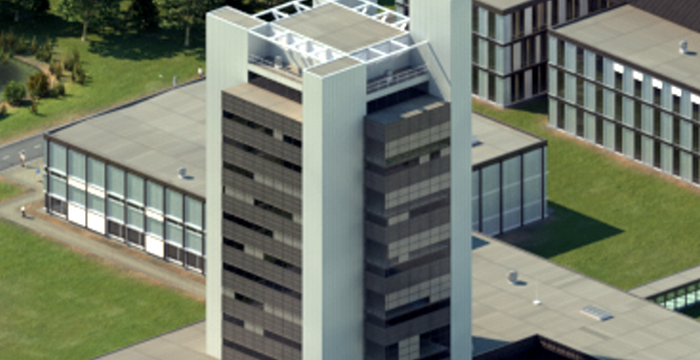The research in the Surface Technology and Tribology (STT) group focuses around surfaces and interfaces in an engineering context as well as degradation mechanisms taking place at these surfaces and interfaces. Surfaces and interfaces are typically complex, and in many cases critical in terms of lifetime and degradation. A solid understanding, as well as accurate and validated models of degradation phenomena at these surfaces and interfaces is important to develop efficient maintenance strategies.
Moving interfaces are very prominent in (mechanical) engineering. Phenomena taking place at these interfaces belong to the field of tribology. Typical tribological phenomena are friction and the different wear mechanisms. In the case a lubricant is present, lubrication can be used to separate surfaces and avoid or reduce contact. The development of experimentally validated models of tribological phenomena at interfaces is one of the focus areas. Fundamental to these phenomena is the contact between surfaces, which is the field of contact mechanics.
The second main type of interfaces are stationary interfaces, as are present in, for example, hybrid materials like metal - polymer combinations. In this context, bonding and adhesion are important and subject of research. Surfaces can be engineered to optimize bonding and hybrid materials can developed based on knowledge about the interfaces present in these materials.
Also, transitions from a stationary situation to a sliding situation are common in mechanical contacts. Examples are highly accurate positioning mechanisms, as well as on a totally different length scale, earthquakes. Transitions from stick to slip and vice versa are also subject of study in the research group, both in positioning mechanisms as well as in faults in the subsurface of the earth.
Apart from chairing the Surface Technology and Tribology group, I am also the Programme Leader of the EngD Maintenance programme and the director of the SKF University Technical Center (UTC) for grease lubrication.
Expertise
Material Science
- Friction
- Surface
- Coating
- Temperature
Engineering
- Models
- Surfaces
- Sheet Metal
Physics
- Model
Organisations
Publications
2024
2023
Research profiles
Affiliated study programs
Courses academic year 2024/2025
Courses in the current academic year are added at the moment they are finalised in the Osiris system. Therefore it is possible that the list is not yet complete for the whole academic year.
- 191155700 - Solids and Surfaces
- 191155720 - Surface Technology and Tribology - C.S.
- 191155730 - Tribology
- 191199198 - Master Graduation Assignment
- 195799152 - Internship
- 201300038 - Failure Mechanisms & Life Prediction
- 201300244 - Capita Selecta Master IDE
- 201300298 - Literature Study - EngD
- 201400046 - Experimental Methods
- 201400551 - CS1 EngD Maintenance
- 201400553 - CS2 EngD Maintenance
- 201400554 - CS3 EngD Maintenance
- 201400555 - Design Project EngD Maintenance
- 201500455 - Assign. Failure Mech & Life Pred EngD
- 201500458 - Assign Maint Engineering & Man for EngD
- 201600357 - Failure Mechanisms & Life Pred for EngD
- 202000011 - SEM 3 Tribology
- 202000134 - Tribology
- 202000247 - Frontiers to High-Tech Systems&Materials
- 202000249 - Master Graduation Assignment
- 202000250 - Internship
- 202200326 - CS High Tech Systems & Materials
- 202400349 - Minor Experimental Mechanics
Courses academic year 2023/2024
- 191155700 - Solids and Surfaces
- 191155720 - Surface Technology and Tribology - C.S.
- 191155730 - Tribology
- 191199152 - Internship
- 191199154 - Internship
- 191199198 - Master Graduation Assignment
- 195799152 - Internship
- 201300038 - Failure Mechanisms & Life Prediction
- 201300244 - Capita Selecta Master IDE
- 201300298 - Literature Study - EngD
- 201400046 - Experimental Methods
- 201400551 - CS1 EngD Maintenance
- 201400553 - CS2 EngD Maintenance
- 201400554 - CS3 EngD Maintenance
- 201400555 - Design Project EngD Maintenance
- 201500455 - Assign. Failure Mech & Life Pred EngD
- 201500456 - Assign. Struct Health & Cond Monit EngD
- 201500457 - Assign. Design for Maintenance for EngD
- 201500458 - Assign Maint Engineering & Man for EngD
- 201600357 - Failure Mechanisms & Life Pred for EngD
- 202000011 - SEM 3 Tribology
- 202000039 - Frontiers in Maintenance
- 202000134 - Tribology
- 202000247 - Frontiers to High-Tech Systems&Materials
- 202000249 - Master Graduation Assignment
- 202000250 - Internship
- 202200326 - CS High Tech Systems & Materials
- 202300353 - Internship (CSE/SET)
Address

University of Twente
Horst Complex (building no. 20), room N106
De Horst 2
7522 LW Enschede
Netherlands
University of Twente
Horst Complex N106
P.O. Box 217
7500 AE Enschede
Netherlands